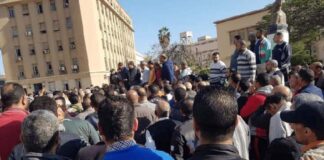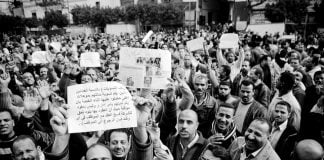A mass uprising in Egypt has forced out President Mohammad Mursi just one year after he took office.
The military was forced to step in and remove Mursi after over 17 million people took to the streets against his regime. The military is a key part of the Egyptian ruling class and leading the counter-revolution. But they were forced into action by the mass movement, just as they were when they removed Hosni Mubarak in February 2011.

The anger and the confidence behind this second revolution has been developing since the first revolution that overthrew Mubarak in 2011.
The Muslim Brotherhood’s Mohammad Mursi was popularly elected—but he was unable to satisfy the demands of the Egyptian revolution for bread, freedom and social justice.
Nearly half the population of 90 million live below or near the poverty line of $2 a day. Unemployment is higher than under Mubarak.
So the Egyptian people in their millions insisted that democracy must mean more than a ballot box choice between dictators, and removed him.
Since 2011, the flight of capital, the drastic 60 per cent drop in foreign exchange reserves and the steady loss of the value of the pound has driven the economy into a downward spiral. The price of importing bread skyrocketed. Mursi wanted to resolve this crisis with a $4.8 billion IMF loan, but he could not impose the fuel subsidy cuts that the IMF demanded on a revolutionary population.
But while hardship was deepening, so was resistance and struggle. Since Mursi’s election, there has been a new wave of strikes. There were an average of over 450 strikes and economically motivated protests each month between July and December. Between January and March 2013 they surged again, with 800 each month.
Mursi’s response was to resort to terror and repression—attacking, jailing and torturing activists. “And thus”, writes Sameh Naguib of the Revolutionary Socialists, “Brotherhood rule became merely an extension on all levels of the Mubarak regime against which the Egyptian people had revolted.”
But the experience of power and confidence could not be so easily deflated. The nationwide “Tamarod” (“Rebel”) petition and four days of street protests were enough for the ruling class to realise that Mursi had to go.
The military
When General Abdel-Fattah Al Sisi, head of the Egyptian armed forces, stepped in to oust the Muslim Brotherhood on June 30, the calculation was not one of how to save the revolution, but how to undermine it. By sacrificing Mursi and the Muslim Brotherhood, both the army and the rest of Egypt’s ruling class hoped to dampen down the protests and find a more acceptable face for Egyptian capitalism.
Sameh Naguib has written, “Expectations of change are sky high. They are higher even than they were when we brought down Mubarak. But the possibility of any new government being able to offer genuine reforms is very limited”.
The interim government led by Adly Mansour offers the same neo-liberal agenda as Mursi and Mubarak, which demands ordinary Egyptians accept cuts to living standards to boost growth.
It will be unwilling to seize the wealth of Egypt’s millionaires and redistribute wealth to address poverty. The new leadership has spent its first days working with the army to reaffirm alliances with the Gulf states, the US and Israel.
The army is very publicly flexing its muscle, with massacres of Muslim Brotherhood supporters and public shootings. The Revolutionary Socialists are only too aware that, “what happens today to the Islamists will happen tomorrow to the workers and the leftists” as the army grasps for control over the population. There are renewed arguments about why the army are no friends of the people, and serve to maintain the power of the rich and the stability of Egyptian capitalism.
The second revolution will need to become a third—one that puts power in the hands not of the Army or another pack of neo-liberal cronies, but the people themselves.





